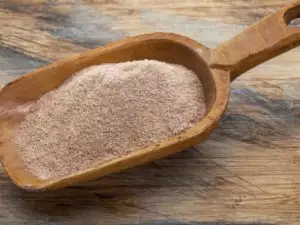Rosehip is an unique herb because it has a very wide range of beneficial effects, which is why it is widely used not only in medicine but also in cosmetology. It has an extremely beneficial effect on the whole body and even today this plant is recognized by traditional medicine. That is why a large number of people use this true natural gift for the treatment of a number of diseases, but also for the preparation of many culinary delights.
Rosehip fruit are rich in various vitamins, minerals and trace elements. That is why rosehip is useful in any form, including as rosehip flour. For example, the fruit of this plant has 50 times more vitamin C than any other citrus fruit.
Since ancient times, rosehip tea has been revered for helping to treat colds and a number of other respiratory ailments, relieving symptoms. Rosehip is also very rich in vitamin A, K, antioxidants, organic acids, riboflavin, pectin, thiamin, tannins, pyridoxine, salts and many other useful substances. It is an extremely valuable source of magnesium, manganese, phosphorus, calcium and nickel.
Benefits of rosehip flour:
- antibacterial action;
- anti-inflammatory action;
- improves liver and kidney function;
- has a strong diuretic effect;
- increases immunity;
- rich source of many minerals, vitamins and antioxidants.

Most often, various drinks are prepared from rose hips, which not only have anti-inflammatory properties, but also have a beneficial effect on the liver and kidneys. They also stimulate the activity of the gastrointestinal tract, have a diuretic effect, do not irritate the kidneys and relieve edema.
On the other hand, vitamin C, or so-called ascorbic acid, has a positive effect on the circulatory system, preventing the formation of blood clots and atherosclerosis. Vitamin P, which is also found in the rosehips of this plant, promotes better absorption of vitamin C in the walls of the esophagus. Vitamin A or the so-called retinol stops the harmful effects of radionuclides and toxic substances.
Rosehip flour is obtained by drying the fruit, which is a rather slow process. However, it is an optimal option, since in this way the plant is not subjected to any stressful influences, such as high temperature and this helps to preserve many of the useful properties and ingredients of rosehip. In this way, all the valuable qualities of the fruit are preserved by grinding the entire fruit during the flour production process.
The applications of rosehip flour are very diverse. It can be added in the cooking of various baked goods, but also for the preparation of cold and hot drinks. You can even make tea from rosehip flour, which becomes very delicate, tasty, rich and healthy.

It is often added even to creams, due to its antibacterial effect. Another option for the application of rosehip flour is in shakes, but be prepared for its slightly sour taste, which, however, contributes to the increase of appetite. You can safely use it even in its raw form, because it is completely safe.
If you like to get creative in the kitchen, then feel free to use rosehip flour to make delicious crackers or sweet biscuits in combination with another type of flour. Precisely because of its many useful properties and its pleasant taste, rosehip flour is increasingly sought after both at home and abroad. If you haven't tried it yet, then feel free to add it to your must-buy list next time.
Read also:
- and how to make rosehip water;




















Comments